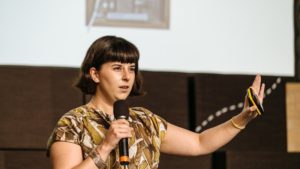IoT influencer visits Dunedin
About 130 people gathered at Otago Polytechnic on 10 July to hear from Alexandra Deschamps-Sonsino, a designer and Internet of Things influencer based in London.
While in Dunedin Alex also met with the Dunedin City Council and the Signal ICT Graduate School, who co-sponsored her visit to Dunedin with Otago Polytechnic.
Information Technology lecturer Thomas Laurenson set the scene by briefly introducing the Internet of Things – objects embedded with small computers that can gather and transmit data.
Thomas explained the research work staff and students are doing to set up a free long range low power wifi network in Dunedin.
 Alex Deschamps-Sonsino then provided the audience with many examples of connected things, demonstrating how the Internet of Things can deliver value for our society, by helping us to understand the world around us better and to control it more.
Alex Deschamps-Sonsino then provided the audience with many examples of connected things, demonstrating how the Internet of Things can deliver value for our society, by helping us to understand the world around us better and to control it more.
For example people could sign up to receive a flood alert when water level reaches a sensor under their local bridge. Trampers or farmers in remote areas with no GPS coverage could carry devices enabled with what3words to communicate their location, specific to a 3m x 3m square. Other sensors can detect pesticide spray.
The accumulation of data is also valuable, for example air quality sensors in a suburb and across a city.
When new behaviours are enabled, that raises issues that need to be addressed. For example how much control do we allow others to have over us.
Sports Direct in the United Kingdom is under scrutiny for requiring employees to wear devices that enable their activeness to be tracked, as a measure of productivity.
Another issue is the security of the data gathered. Alex is currently leading work on development of an IOT certification mark, a framework of standards which connected objects should meet.
Alex also sees that the Internet of Things provides an opportunity to build local community. The technology is available globally, the learning is available globally, so we are not dependent on the solutions which global corporations might offer, but can produce our own home-grown solutions to local issues.
The Internet of Things has important implications for local manufacturers. The first is to consider what new products might now have a market, and what sensors could be embedded in existing products to add value.
What data could you provide that would be useful for your customers? Alex says people are willing to pay more for something different.
Secondly, increasing automation will mean some traditional jobs will no longer require human employees – Alex mentioned driving for example, and contract drafting.
What are the implications for the workforce? What else could those employees be doing to add value to your business? How do we reskill employees for new work?
Finally, when asked to predict the future of the Internet of Things Alex told the audience that she expects to see a much more connected industrial landscape. Factories will be internally connected, producing data that will enable informed decisions to be made to improve productivity.
There is potential to use data not just to detect and control anomalies but for optimisation and prediction to get the most out of machinery.
Alex’s visit to Dunedin coincided with the release of the IoT Alliance’s report. The report identifies some of the benefits of the Internet of Things to the New Zealand economy, including opportunities for the manufacturing sector.
IoT Alliance calls on the New Zealand Government to become a catalyst to encourage business to invest in Internet of Things technology.



